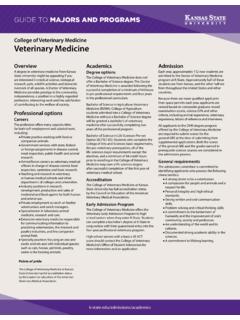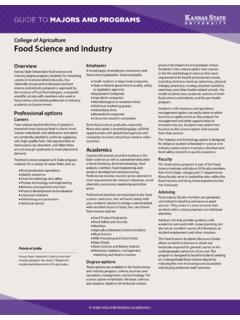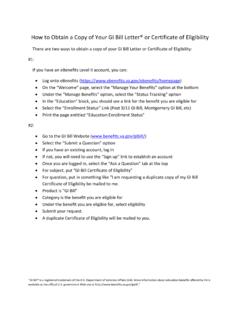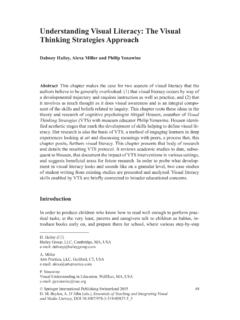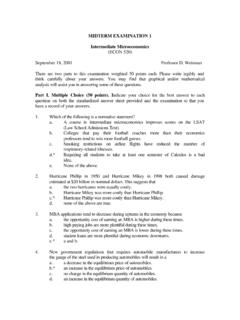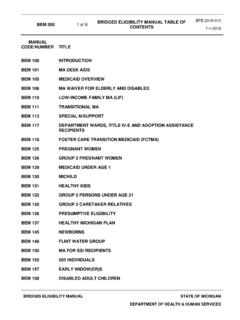Transcription of Cognitive Restructuring -- Choosing a Positive Attitude ...
1 Cognitive Restructuring : Employing a Positive Attitude and Helpful Thoughts Negative thoughts or self-talk can inhibit our energies and keep us from taking steps to achieve our goals. Conversely, Positive thoughts and self-talk can activate our energies and help us take steps toward our goals. The following are a few simple strategies to help you develop helpful self-talk and Positive attitudes toward the life situations you face. Although the strategies may seem simple, Restructuring our thinking and attitudes is an on going process. So, be patient and easy on yourself as you go about refining the continuous dialogue of your mind. I. Positive Affirmations1. It is easy to give yourself negative feedback. Instead, give yourself Positive strokes and strengthen your self-esteem with Positive affirmations, such as: Damn, I'm good. and I have confidence in myself.. Here are some guidelines for creating Positive affirmations that can work for you: 1.
2 Phrase your affirmation in the present tense such as I am a loveable person.. 2. Phrase your affirmation in the most Positive way. 3. Make your affirmation simple, clear, and precise. 4. Choose an affirmation that feels right for you. Now, create your own, or below are some examples that you might want to use for yourself. Positive affirmations should be somewhat short; something you can repeat to yourself in one breath. Repeat to yourself your Positive affirmations many times throughout the day. Or make a tape recording of yourself speaking your Positive affirmations and then listen to this Positive self-tape each day. I am calm and relaxed My body is full of energy I radiate success I am one with the universe I am an important piece of the whole I am a beautiful human being I am a winner 1. Adapted from Brian Luke Seaward, II. Making Accurate Primary Appraisals2. When you are feeling down it is easy to overgeneralize unhappy life events as being absolute and unchangeable.
3 When this happens, force yourself to question your faulty thinking and make more accurate appraisals of the situation. Here are some examples to help you change faulty appraisals into more accurate revisions: Self-blame Inaccurate self: Because I forgot this was a day I had planned to workout with some friends at the Recreation Center, I'm a bad person. Accurate self: Making a mistake is unfortunate, but it does not mean I am a bad person. Irreversibility Inaccurate self: I am physically out of shape and will always be this way. Accurate self: I can learn a plan and ways to implement a plan to improve my physical fitness. Overgeneralization Inaccurate self: Person A was mean to me. Nobody likes me. Accurate self: Person A was mean to me, but there are many people who like me. Absolutism Inaccurate self: My life is worthless without my lost love. Accurate self: My lost love does not constitute my whole life. Personalization Inaccurate self: My professor is mad because I scored low on the test.
4 Accurate self: My professor is mad because the class as a whole scored low on the test. Overreacting Inaccurate self: I binged on cookies today and didn't follow my daily healthy eating plan. I have failed in my nutrition program. Accurate self: One day of not following my daily eating plan does not mean I have failed in my nutrition program. III. Fine-Tune Your Expectations It is believed to be easier to refine expectations prior to meeting a stressor in a particular life situation than to reframe a negative Attitude or thought after the fact. If we go into situations with preconceived expectations or if we repeatedly find we are not meeting the goals that we set for ourselves, then we often generate negative feelings and thoughts around the situation. Fine-tuning our expectations or goals does not mean abandoning ideals or lowering self-esteem. Rather, fine-tuning expectations and goals means that we run them through a reality check, question how reasonable they are, and then, if needed, adjust them to better match the given situation.
5 2. Adapted from Coping with Life Challenges, Chris L. Kleinke, 1998. IV. Seven Healthy Thoughts to Reduce Stress3. Thought #1: NOBODY'S PERFECT. NOT EVEN ME. Thought #2: MY WAY IS ONE WAY. Thought #3: GRAY IS SOMETIMES THE BEST COLOR. Thought #4: THE SWOOSH PRINCIPLE: JUST DO IT. Thought #5: A LITTLE WORRY GOES A LONG WAY. Thought #6: I WILL SURVIVE, WHETHER YOU LIKE ME OR NOT. Thought #7: ONLY ZEBRAS CANNOT CHANGE THEIR STRIPES. V. Take Satisfaction in Your Accomplishments At the end of each day, recall all the things you accomplished, no matter how small you think the accomplishment is. Maybe you made a new friend. Tried a new food. Completed you daily exercise goal. Finished your research paper (or several paragraphs of the rough draft!). No need to waste time dwelling on your shortcomings. Feel good about what you did accomplish and accept the things you cannot change in yourself and others. Give yourself a pat on the back.
6 Say congratulations to yourself. Smile inside. Display any indicator of your accomplishment ( , put the excellent paper on the refrigerator). Write down your daily accomplishments and keep your accomplishment resume up to date. 3. by John Robertson.



